Table of Contents
What is an Original Character?
It’s a character that sticks with you even when they’re long gone from your screens. It’s a character that serves as a reference point in casual conversation or a character that sums up a behavior or generation.
original, adjective
“not the same as anything or anyone else and therefore special and interesting…”
— from The Cambridge English Dictionary
Most importantly, in screenplay terms, an original character is a character that shines through in spite of any other weaknesses within that screenplay.
For a Screenplay Reader or Development Executive, an original character is an element of a script that stands out. No matter how busy they are or no matter how much work other elements of the script need, the original characters steal the show.
Great characters are at the very heart of great screenwriting and original characters can help elevate great to superlative.
Whether plucked from real life, an amalgamation of real people or just simply a genius stroke of creativity, these are original characters…
The fourteenth in our original characters series will look at Michael Scott from The Office.
*The following article contains spoilers for The Office*
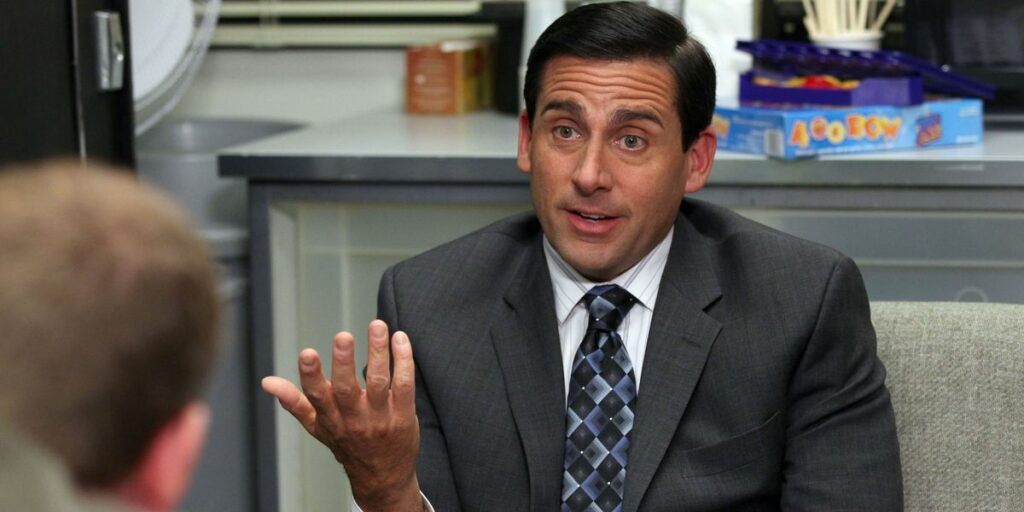
Who is Michael Scott?
Michael Scott is the Regional Manager of a mid-range paper supply company called Dunder Mifflin in Scranton, Pennsylvania.
He is the self-proclaimed “world’s best boss”, who often distracts and insults his employees. Michael Scott considers himself an entertainer and is desperate to be the center of attention.
At first glance, he’s immature, incompetent, and offensive. Michael is typically painfully unaware that his humor and behavior are inappropriate.
However, there is more to Michael Scott. Michael has a need to be liked and wants to be the funniest guy in the room. Michael is not dumb, he knows that being smart is important. So he pretends to be smarter than he is. This leads to him mispronouncing a lot – A LOT of words.
What else is there to say about Michael Scott? He attends an improv class, he’s written an action movie starring himself as the main character, he likes to do magic tricks, and he’s an excellent ice skater. He covers a lot of ground as a character. But most important of all though, he thinks of his employees at Dunder Mifflin as his family.
Under his ‘insensitive entertainer’ facade, he’s simply a lonely man wanting to be included and admired. And this is what makes him such a compelling and original character. He might be a well of cringe. But the series always demonstrates the motivation for that cringe – the desperate need to be liked.
“Would I rather be feared or loved? Easy. Both. I want people to be afraid of how much they love me.”
— Michael Scott
Complex, Three-Dimensional Characters
Even characters in a sitcom need depth and a variety of traits to transform them from two-dimensional characters to well-developed three-dimensional characters.
There are layers to Michael Scott. And his moments of vulnerability throughout the series make him more sympathetic and likable. Season 2, Episode 1, The Dundies, for example, is the moment where Michael Scott reveals a more human and honest side to his character.
The first half of the episode is Michael making preparations for his annual Dundies award ceremony. Here, he gives his employees fake trophies for a variety of categories, some flattering, some insulting.
There are two moments within this episode that develop Michael into a three-dimensional character:
- Jim asks Michael not to give Pam the Longest Engagement Award at the Dundies because he knows it will upset Pam. Michael is at first very apprehensive about this idea. In the end, Michael decides to give Pam the award for Whitest Sneakers instead.
- Other people in the restaurant heckle Michael as he’s hosting the Dundies. He is clearly upset by this, and acts hurt and defeated. It is Pam who comes to the rescue, cheering Michael on as the other co-workers join in. With encouragement, Michael jumps right back into giving out his Dundie awards.
It’s almost discomforting to see a character who’s normally so full of himself become rather sad and pathetic. But it makes Michael Scott more human, and someone to root for.
If Michael didn’t have these moments of genuine sadness, kindness, or competence, he would not work as a character. Or at least not feel as nearly original and complex as Michael Scott truly is. These moments turn him from a punchline into a fully-rounded character. And this is essential in creating a comedic character that lasts multiple seasons.
The Evolution of Michael Scott
One of the characteristics of a complex character is the ability to develop or grow as their story continues. And Michael Scott subtly does this through his seven-season run on The Office.
Season One Michael Scott:
It’s somewhat of a miracle that The Office (US) even continued past the first season, given Michael Scott’s initial unlikability. Michael Scott in season one mimicked his British counterpart, David Brent. When we are first introduced to Michael Scott in season one, he has few likable or redeeming qualities.
In season one, none of his employees at Dunder Mifflin seem to like him. And they only tolerate him because of his position as boss. He’s often cruel and insensitive in his attempts at humor, going as far as pretending to fire Pam for no other reason than to be mean, for example.
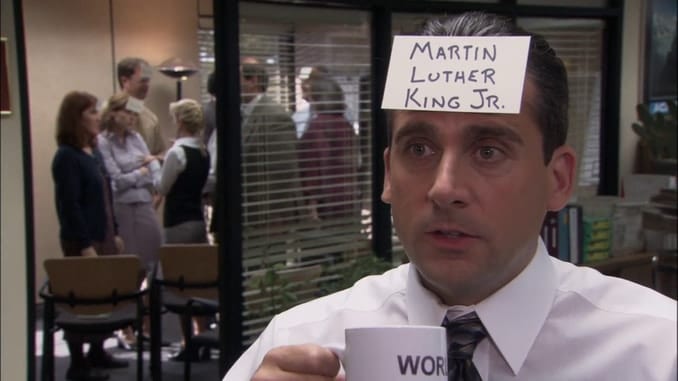
Season Two Michael Scott:
Michael begins to develop into his own character in season two, primarily through his visible vulnerability. Each of the episodes in season two reveals something entirely new about his character.
Take for example his competence as a salesman in the episode, The Client. Or in the episode, Take Your Daughter to Work Day, which reveals Michael’s childhood loneliness. Moreover, his former desire to get married and have his own family is reignited.
Michael will always have his cringe-worthy, awkward moments. But now he is more well-rounded. These moments of backstory and context are vital to building Michael as a more complex, original character and not just a vessel for comedy.
The comedy, consequently, is heightened by this roundedness, demonstrating how deft and in-depth characterisation is vital to all genres.
The Later Seasons
The main difference between Michael Scott from season one and Michael Scott in later seasons is that he shows sympathy. He will even go to great lengths to make things right, even if his plans aren’t always the best. For instance, when Michael kisses Oscar in front of the office to prove that he’s not homophobic.
“Comedy and drama are different sides of the same coin. And the thing about comedy and drama is about likability. It’s about character first. It’s about the story. And for me, it’s about empathy, and I think the more real someone is, the further you can go either way with them.”
Ricky Gervais
He also has genuine moments of praise and kindness towards his employees. This proves not only how much he wants them to like him but how much he cares about them.
This is, again, a way of demonstrating Michael’s depth as an original character. The series slowly unfurls Michael as the cringey boss we first meet and into someone that it becomes increasingly satisfying and complicated to try and understand.
Michael Scott’s Relationships
It’s not just Michael’s own characterisation and backstory that helps flesh him out. It’s the relationships he has with his colleagues. Michael’s relationships perfectly demonstrate how character dynamics are vital to developing a fully rounded character. Ultimately, it’s the characters’ relations to one another that reveal who they truly are.
Dwight Schrute
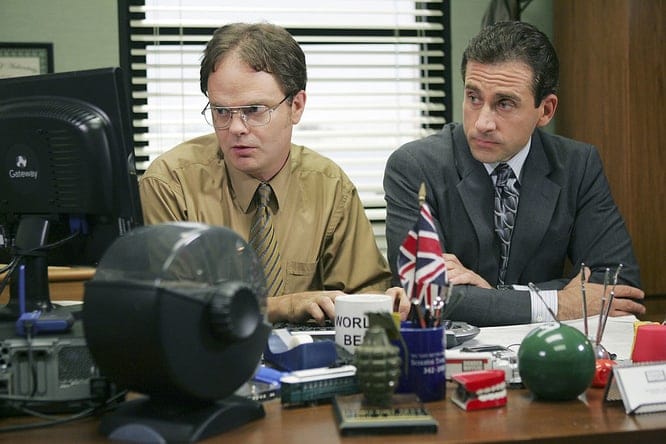
Dwight is the assistant to the Regional Manager. But he constantly refers to himself as the Assistant Regional Manager in order to seem closer in power to Michael. In the first half of the show, Dwight idolizes Michael because of his position as boss.
Dwight will go to ridiculous lengths to please Michael, even though Michael normally isn’t appreciative. Although Michael gets annoyed by Dwight’s antics, Dwight is also the only one who usually laughs at Michael’s jokes and agrees with him.
Dwight Schrute can be considered the ‘sidekick’ to Michael Scott. The main difference between the two is that Dwight does not need to be liked by his co-workers, he simply wants them to obey his orders. Again, this highlights Michael Scott’s key engine as a character – what drives him and what ultimately draws us to have empathy for him.
Pam Beesly
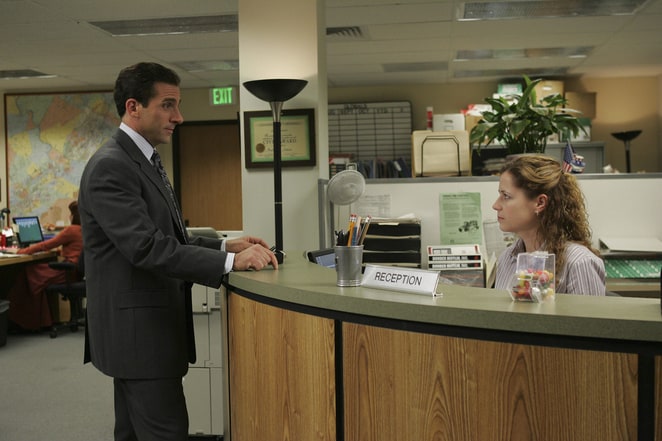
Pam is the receptionist at Dunder Mifflin. She is usually a silent observer to Michael’s antics with Jim. Pam also serves as Michael’s assistant and confidant.
Michael has his moments of crossing a personal boundary or saying something offensive. But Pam is more accepting of Michael than others in the office. Pam humors Michael and sympathizes with him the most, which leads Michael to become fond of her over time.
There are times when Pam and Michael will come to each other’s aid, showing how much the two of them care about each other. For example, when Pam joins Michael when he quits Dunder Mifflin and starts his own paper company, or when Michael comes to Pam’s art show to support her.
Pam serves as a good bellwether for Michael’s kindness and heart. His actions towards her are often what reveals the kindness underneath his surface.
Jan Levinson
Michael has a variety of love interests throughout the course of the show. Most notable is his relationship with his former boss, Jan Levinson.
At first, Jan is often the one to scold Michael for his behavior. She seems like the sane, practical one.
- The two share a kiss after Michael lands them a sale. From then on the two have a chaotic on-again-off-again relationship.
- Michael romanticizes the idea of Jan and wants to pursue a real relationship, while Jan is… conflicted.
- At first, she wants their relationship to be professional. But she’s fragile after going through a divorce and indulges in this forbidden relationship with Michael.
Michael’s personality consistently embarrasses Jan. And when Michael starts to realize that maybe this relationship isn’t a good thing, Jan gets a boob job and due to Michael’s immature side, of course, he can’t leave her now.
Jan’s complete downward spiral starts when she is fired from her job. The full extent of their toxic relationship is revealed in the episode, Dinner Party. One of the arguments they have in front of their guests revolves around the fact that Michael wants kids but Jan keeps changing her mind, forcing Michael to get vasectomies and then reverse them.
Their relationship proves that Michael does want love, but isn’t fully sure how to have a normal, healthy relationship. It’s an important dynamic to show the gap between Michael’s goals and the reality – what he wants and what stops him.
Holly Flax
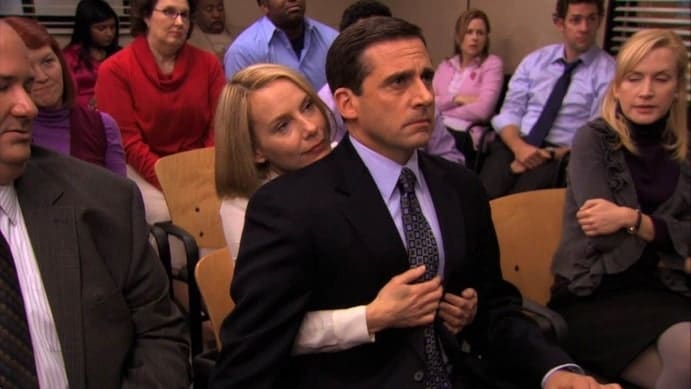
Holly is introduced at the end of season four as the human resources replacement for Toby, Michael’s nemesis. Michael is ready to hate Holly but is thrown off guard when she is kind and funny.
In Michael’s past relationships, he always had to sacrifice part of his personality. With Holly, however, he is able to be himself. Holly matches Michael’s personality by indulging in his humor with him.
Their relationship does have its obstacles. However, Michael is willing to simply enjoy the moments he gets to spend with her even when they aren’t able to be together romantically.
The most unique thing about their relationship is what it does to Michael’s character. His character grows because of Holly. Not because she’s making him, but because he wants to be his best, for her.
There are a few examples of this: For example, when Michael is able to admit that he’s not an amazing filmmaker in Threat Level Midnight. Or when Michael is finally able to recognize that his friend Todd Packer is actually an awful person.
His biggest character growth comes when he makes the decision to leave Dunder Mifflin to move to Colorado with Holly after proposing. Michael finally makes the distinction that his employees are not his family since he finally has his own family with Holly.
“Holly’s my family now. She’s my family. The babies that I make with her, will be my children. The people that you work with, are just… when you get down to it… your very best friends.“
— Michael Scott
So Holly is essential in rounding off Michael’s character arc. She shows his true, ultimate growth. This consequently slows down the engine that makes him tick as a character. And he’s, therefore, able to exit the series, satisfyingly.
In Conclusion: The Lasting Impact of Michael Scott
Michael Scott still remains one of the most influential characters to exist in comedy TV, long after the seventh season of the series aired.
When looking back on the show, Michael Scott truly has some hard-to-watch moments of ignorance. But it is because of his redeeming moments and character growth that his character still holds up today.
What on the surface seemed to be your typical annoying boss character, developed into a complex, unique, and hilarious character who you can’t help but love upon rewatches of the show. His presence throughout the series perfectly demonstrates how to set up, maintain and conclude a character arc rewardingly.
The empathy at the heart of Michael Scott’s characterisation is what makes him such a long-lasting character. He’s a great example of how even in the comedy genre, complex three-dimensions are essential to rewarding characters and drama.
This rich characterisation is not the preserve of drama alone. And The Office proves this in spades. Characters may be the source of a great well of comedy and punchlines. But in order to truly stick in the mind, they need to have many believable dimensions.
–What did you think of this article? Share It, Like It, give it a rating, and let us know your thoughts in the comments box further down…
– Struggling with a script or book? Story analysis is what we do, all day, every day… check out our range of script coverage services for writers & filmmakers.
This article was written by Gracie Vicente and edited by IS staff.
Get *ALL* our FREE Resources
Tackle the trickiest areas of screenwriting with our exclusive eBooks. Get all our FREE resources when you join 60,000 filmmakers on our mailing list!

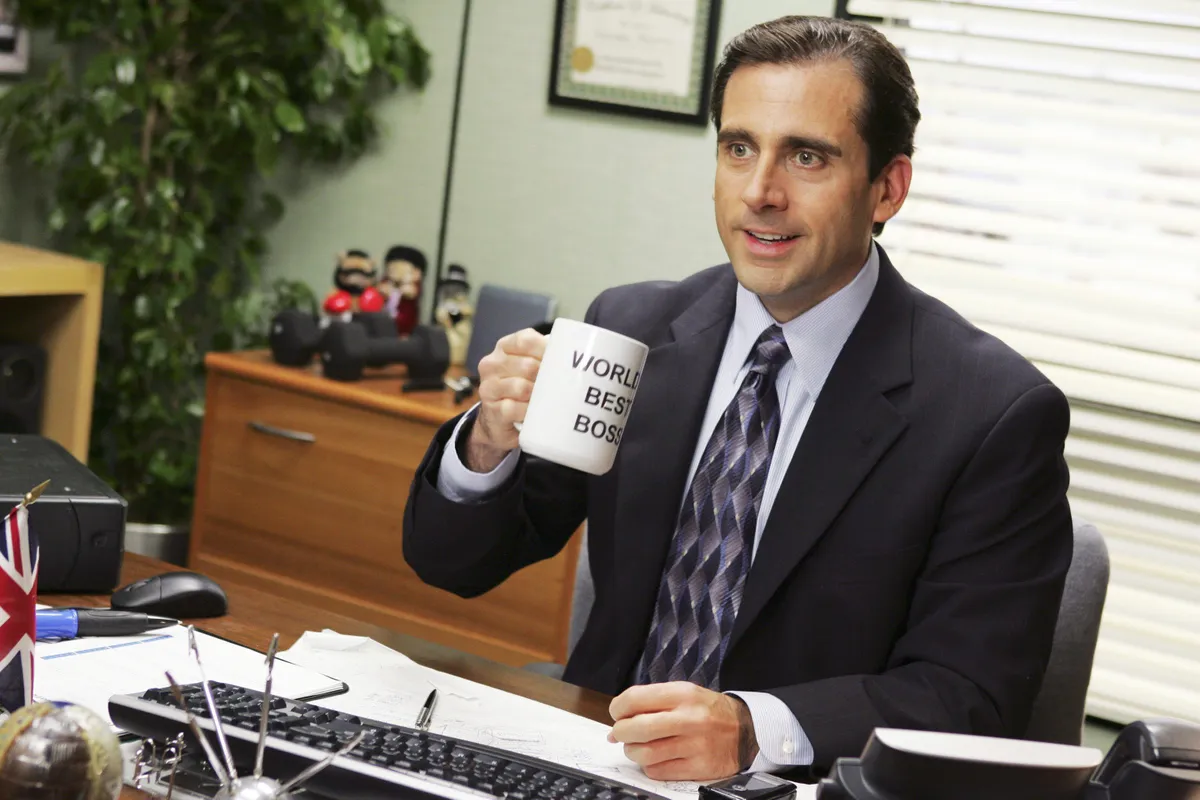
Thanks for sharing this and with the simplicity in which you did. I have been writing a 1pg. journal for my characters as a resource to think of what they are up to off screen, when looking for a sub or twist or some shoe leather.
This well written Blog on Character Development inspires to describe or “Who is Character”. A Macro look to the Micro Journal version I’ve been using.